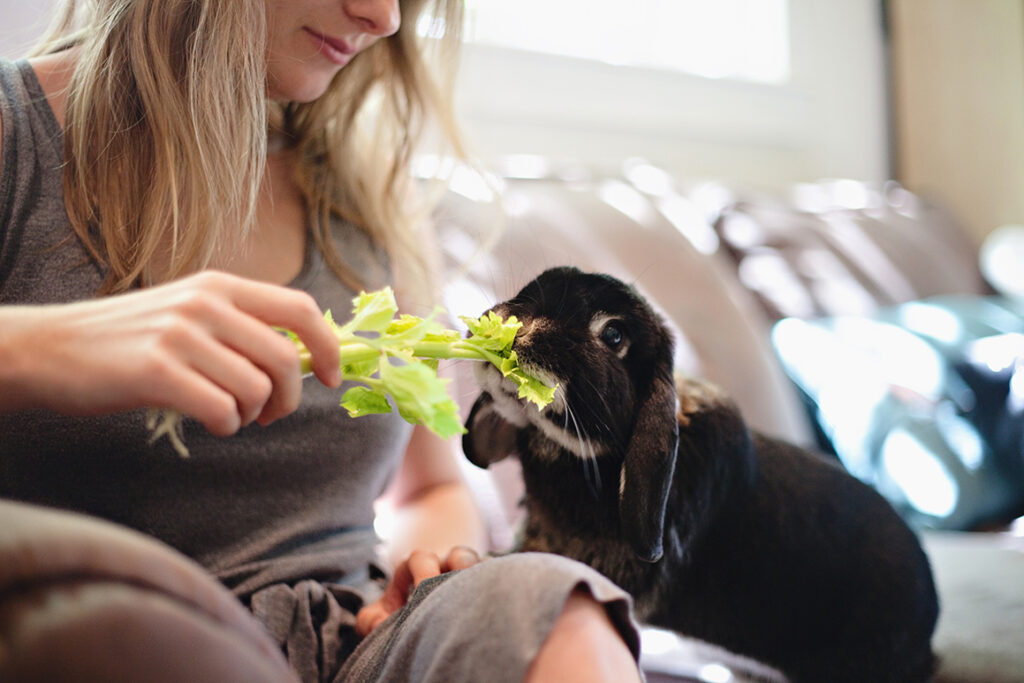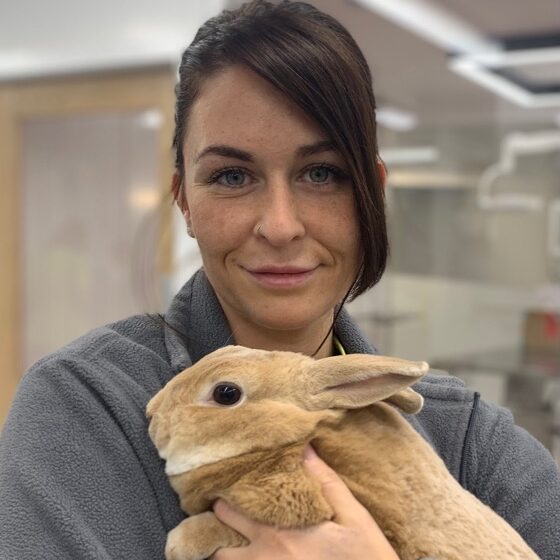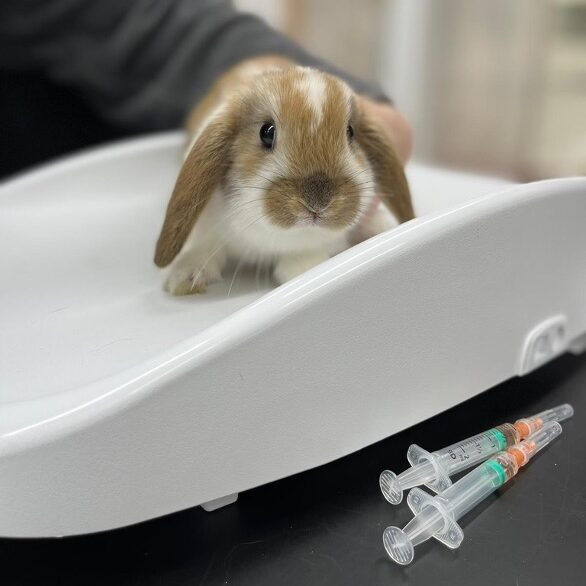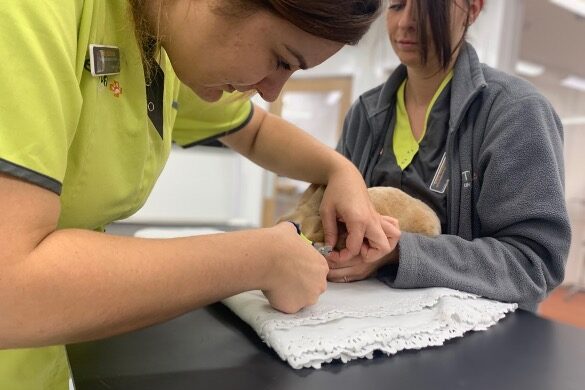
Are you thinking about getting a rabbit this year? If you are then you aren't alone as rabbits are very popular pets in the UK with more than one and a half million in homes across the country.
Before you get any pet, it is important that you thoroughly research what bringing this animal into your home might entail. We hope this blog post will help to answer some of those questions that you may have.
Book your new rabbit in for an appointment at The Pet Vet
Indoor or outdoor?
Rabbits are known for their friendly nature and can live indoors or outdoors depending on how you want to raise them. Rabbits although can be shy with people, are also very sociable animals and prefer the company of another rabbit to live with them. You may need to consider this when choosing your pet. Once you've decided whether to keep your rabbit indoors or outdoors, either way you will need to invest in a nice, cosy wooden hutch for them to live and sleep in.
If your rabbit is going to live outdoors, you may want to consider a large hutch with a run so it can exercise freely. This needs to be situated somewhere that is safe, sound and secure from predators and sheltered from the cold of the winter or the heat of the summer.
If you decide to raise a house rabbit, like any pet, you will need to pet proof your home. This includes keeping away all wires, cables and any furniture that you don't want to be chewed. Did you know that rabbits can be housetrained to use a litter tray for toileting? Well it's true, they are really quite clean animals. Like our other house pets, our rabbits want to impress us too!
Diet
Rabbits are vegetarian or herbivores meaning that their diet consists of plants, flowers, fruits and vegetables. Hay is a popular choice in a rabbit’s diet which can also be used for bedding in a hutch. Hay comes highly recommended for rabbits as it is rich in all the nutrients that they need. Chewing on hay also helps to wear down their teeth and it may also stop them chewing your chair leg! Hay also helps rabbits to feel full and prevent overeating and is suitable for all ages of rabbit.
Our Lincoln vet Emily Mann said “Rabbits’ teeth continually grow throughout their lifetime. In fact they can grow up to 12 centimetres during their life. So it is important that through diet and regular chewing they are able to wear them down themselves. However, if they do grow too long it can cause your rabbit pain and will need to be trimmed back.”
When feeding your rabbit, you may want to consider buying a small bowl or a dispenser for their food and is a must for their water. If they are eating grass or hay, this can simply be given to them on the ground.

Toys
Like dogs and cats, you need to keep your rabbit entertained by giving them lots of interesting things to keep them happy. You can buy things like chewsticks and give them obstacles to run around and over to provide some entertainment during their day. They really are quite fun pets to have!
Cleaning
Whether you keep your rabbit indoors or outdoors, you will need to make sure that they are always kept as clean as possible. You will need to change their bedding and litter trays at least daily and thoroughly disinfect their hutch once a week.
Common rabbit ailments
At The Pet Vet we see rabbits everyday with various issues and thought it would be a good idea to list the most common diseases we see in our surgeries.

Our Senior Veterinary Nurse Emily Heysmond has come up with this list to look out for:
Appetite
A loss of appetite could mean many things but if it is associated with other symptoms such as stomach pain or any swellings, dribbling from the mouth or mucus being passed instead of droppings then it may be time to call the Vet. If a rabbit does not eat for more than five hours it is important that you call your Vet as soon as possible.
Balance
A loss of balance or an apparent head tilt is usually a symptom of a bacterial infection in the ear or brain. It can be the result of a specific parasite and can be passed to other rabbits and even humans. Typical symptoms of this infection are not being able to stand or struggling to stand and it may also circle its head. If your rabbit has this condition, they should be kept quiet with very little lighting so they don't hurt themselves.
Breathing Difficulties
If your rabbit appears to be having difficulty breathing (fast, open mouth or noisy) and perhaps has discharge coming from its eyes or nose, this could be an indication of a respiratory infection or heat stress both of which are extremely serious. Contact your Vet as soon as possible if this happens.
Ear mites
Ear mites are another unwanted parasite. This can cause scaly skin inside the ear which over time turns into crusty lesions and result in hair loss. It is not pleasant for rabbits but it is not considered an emergency. However if left untreated, it can cause an infection leading to loss of balance and even hearing. If your rabbit is seen to be scratching around their head and ears, they may have ear mites.
Fly strike
This is something that tends to happen more during the warmer weather and is caused by flies that are attracted to rabbits' fur particularly if it is soiled. With fly strike, a fly can lay hundreds of eggs on a rabbit's skin which then very quickly hatch, sometimes within hours resulting in hundreds of maggots feasting on your rabbits skin. It is a devastating condition for a rabbit. If this has happened to your pet get them seen by a Vet as soon as possible. This is a reason why you must keep your rabbits very clean everyday.

Viruses
Myxomatosis
This fatal disease has been around in the UK since the 1950s and when it arrived it almost eliminated rabbits from the UK. It is spread by insects such as fleas and mosquitoes and will cause symptoms such as swelling around the ears, eyes, genitals and anus and if left untreated is fatal. Myxomatosis is a preventable disease through vaccination, so it is important to make sure your rabbits vaccinations are up to date.
RVHD
Another preventable illness is RVHD otherwise known as rabbit viral haemorrhagic disease which is an illness that is spread between rabbits. Unfortunately it is not always obvious when a rabbit has RVHD and could die without warning. By keeping your rabbits’ vaccinations up to date there is far less chance of your rabbit ever contracting this virus.
Contact us to book an appointment
Paralysis
Rabbits are known for their stereotypical ‘hopping’, but if they are walking a little bit strange or not at all, they may have a fracture, nerve damage or dislocation. Sadly these are quite common injuries found in rabbits and must be seen by a Vet as soon as possible.

